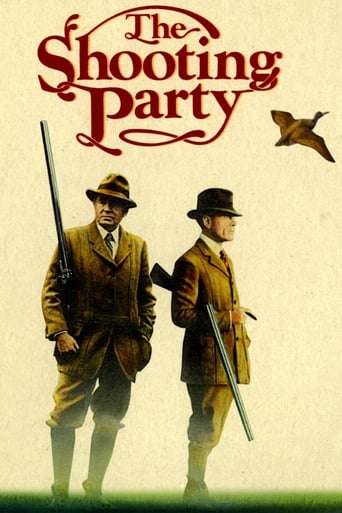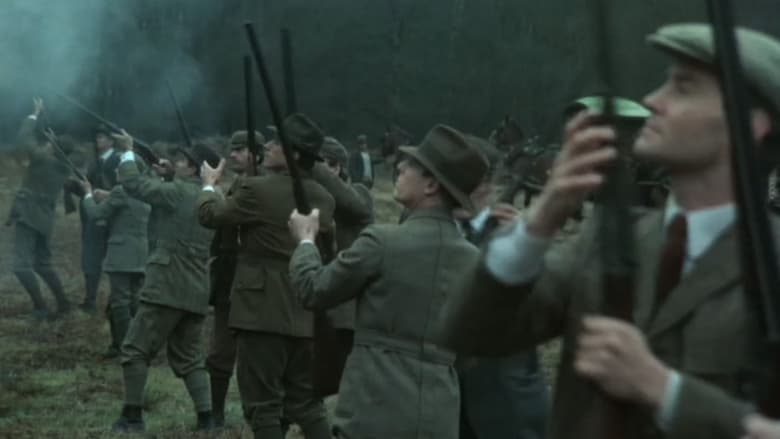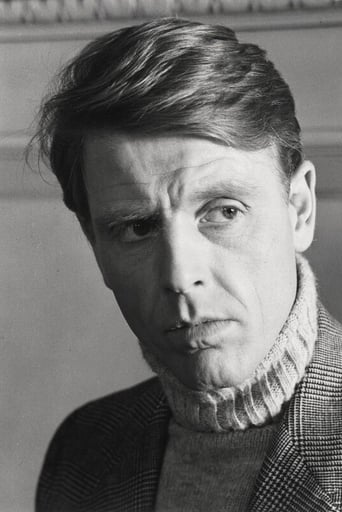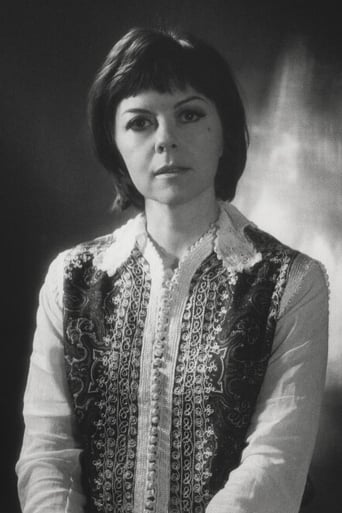The Shooting Party (1985)
1913, shortly before the outbreak of WWI. A group of aristocrats gathers at the estate of Sir Randolph Nettleby for a weekend shoot. As the terminal decrepitude of a dying class is reflected in the social interactions and hypocrisy of its members, only world weary Sir Randolph seems to realise that the sun is setting.
Watch Trailer
Free Trial Channels
Cast


Reviews
Disturbing yet enthralling
Fun premise, good actors, bad writing. This film seemed to have potential at the beginning but it quickly devolves into a trite action film. Ultimately it's very boring.
I have absolutely never seen anything like this movie before. You have to see this movie.
There are moments that feel comical, some horrific, and some downright inspiring but the tonal shifts hardly matter as the end results come to a film that's perfect for this time.
It's difficult not to see the past through the spectacles of the present, and this is more obvious 20 years after this film was made. The beautiful Lady Olivia has the opinions of an educated, liberal woman of 1985 - she likes the socialist Ruskin! How flattering to ourselves as we identify with her. How smug we feel as we tut tut over the class ridden society of pre WWI England! Sorry, folks, English society is still just as class ridden, and rich people still have servants - they just don't dress them in white caps and aprons or call them parlourmaids. Am I alone in finding Lady Olivia and her admirer unspeakably wet? And surely nobody said "nothing in common", "keep in touch" or "competitive" in 1913? (They certainly did in 1985.) In the Shooting Party, tragedy occurs because the soppy Ruskin-reader and Edward Fox try to outdo each other. This is not only ungentlemanly, it is competitive. In the 80s competitiveness was evil. We had to believe that we are all the same, and different skills and talents are due to environment, education, empowerment and access. So if anyone excels it is due to competitiveness. People went right on being competitive, though, especially when it came to trading Marxist pieties. Despite those reservations, though, this is an excellent film with some great acting, costumes and atmosphere. PS The real Cornelius Cardew was a communist British composer.
The Shooting Party is set in 1913, which is not very long ago, and yet is another world. This was the last year of the old world, and the start of the modern world. The opening narration by James Mason sets the theme: that the world of the haves and have-nots is doomed, and that the future holds great change.This was Mason's last film, and his was a part very well suited to him. He is the great patriarch, head of the family, and benign chief of the great estate. He is not a soppy fool, but he is kind and means well to all. He invites many aristocrats to his estate for a few days of shooting, and these arrive, with their servants.In the house, then, are representatives of much of the world at that time: the upper classes, some British, some foreign, and the lower classes, some servants, some local rustics who will be the beaters for the shoot. The film then shows us how they are all behaving.Both the upper and the lower classes are stuck in their ways, though if anything, it is the upper class which questions whether this is the way things should be. When the shooting pauses for tea, the posh folk sit elegantly but uncomfortably in a clean white marquee, and drink from china, while the beaters look far happier drinking from mugs from a communal urn and chatting amongst themselves.The foreign aristocrats are haughty, and annoy the British by referring to the beaters as "peasants". The British aristocrats are not happy. Two young idealists are in the agony of a forbidden love, others have sham marriages or petty rivalries.The world is one full of love, but much of it frustrated. A boy has a pet duck, which he fears will be shot. Mason has a liking for a local poacher whom he hires as a beater, despite the contempt which the hunt master has for the man. By the end of the film, you feel great liking and sympathy for many of the characters.To get the most from this film, some knowledge of history and British culture is required, but there is much to like in this film without these. The acting and dialogue are good, the setting atmospheric, and what is being said about the people of the time is so very fair. This film does not hammer home any of its points, but shows both the good and the bad in the characters, and lets the viewer decide.All through the film, our present-day knowledge of the slaughter to come in the churned mud of the Somme, Ypres, Paschendale and the Dardenelles stays with us, affecting the way we perceive every nuance. The film makers were clearly aware of this, and take full advantage of it.The ending is one of the most moving I know from any film. Simple, yet very effective.
Banal carnage. A nice allegory, just as a game keeper raises birds for sport so a social order, a decaying aristocracy, breeds masses for war. Trouble is these particular aristocrats ARE actually as boring as they are bored, and waiting around the whole film for the last minute is slightly tedious. A nap before tea is recommended. The atmosphere is perfect. Gielgud is great as an eccentric caricature -- when will a vegetarian be portrayed as anything but a looney in a movie? Mason is perfect as the button-down aristo so shocked that his shooting party should result in human death, so close to death himself. Is the movie too weighty from all the irony? I liked it, 7 out of ten.
This film is set on a great English estate during the last days before the outbreak of World War I. A superb cast including James Mason (in his last role), Robert Hardy, Edward Fox and Gordon Jackson combine their talents to produce a wonderful, if gloomy, peek at the comfortable world of Queen Victoria and King Edward VII that was about to come tumbling down. The plot foreshadows the social and moral upheavals that will be faced but does so with a grace and subtlety that makes this a film worth seeing.








